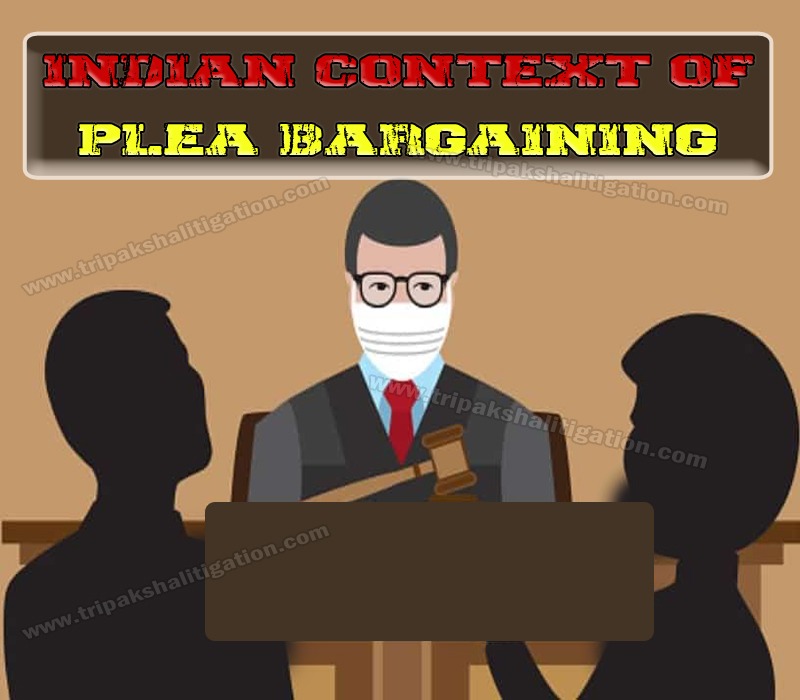INTRODUCTION
Hailed as the panacea for our overburdened criminal justice system, plea bargaining was introduced by promulgation in Indian law in year 2005.
The Doctrine of Nolo Contendere or Plea Bargaining has been introduced by Criminal Law Amendment Act, 2005. A new Chapter XXI A on Plea Bargaining was introduced in the Criminal Procedure Code, 1973. The term Plea Bargaining can be defined as pre-trial negotiations between the accused and the prosecution where the accused pleads guilty in exchange for certain concessions by the prosecution. The twin object of plea bargaining is to reduce the delay involved in criminal trial and to punish the accused with a lesser sentence for pleading his guilt.
Plea bargaining is basically a negotiation that happens in the pre-trial period between the prosecution and the accused, in this type of negotiation where, in exchange of certain concessions given by the prosecution, the accused pleads guilty. In other words, the accused pleads guilty to a lesser charge. However, it is important to note that plea bargaining is not available for all types of offences and crimes. A person cannot claim plea bargaining for grievous offences such as murder and homicide or offences punishable with death sentence or life imprisonment.
ORIGIN:
In India, the concept of plea bargaining was brought about by way of the Criminal Law (Amendment) Act, 2005 which introduced Chapter XXI A in the Code of Criminal Procedure, 1973. The Act was made enforceable from 5th July 2006. The concept of plea bargaining has been borrowed from the Constitution of the United States of America. It was first suggested by the 142nd Report of the Law Commission of India as an alternative step to tackle huge arrears and loopholes of the criminal cases in the courts.
Under the NDA government, a committee was established which was headed by Justice V.S. Malimath, former Chief Justice of the Hon’ble High Court of Kerala and Karnataka, to resolve the issue of the escalating criminal cases stacking up. The Malimath Committee in its Report in 2003 also recommended the plea-bargaining system as an amicable solution for quick disposal of criminal cases.
Historically, in the jury system, there was no necessity for plea bargaining as there was no legal representation. It was only after the 1960s that the necessity was felt, when legal representation was introduced. Previously, plea bargaining was used by the judges to encourage confessions. With the evolution of criminal justice system, plea bargaining is now used for the faster disposal of criminal cases and to lessen the burden on the courts.
PLEA BARGAINING IN INDIAN CONTEXT:
The concept of Plea Bargaining attracted enormous public debate. Critics said it is not recognized and against public policy under our criminal justice system. The Supreme Court also time and again blasted the concept of Plea Bargaining saying that negotiable in criminal cases is not permissible. Moreover in landmark case of “State of Uttar Pradesh Vs Chandrika”, the Apex court held that it is settled law that on the basis of Plea Bargaining court cannot dispose of the criminal case. The court has to decide it on merits. If the accused confesses its guilt, appropriate sentence is required to be implemented. The court further held in the same case that, mere acceptance or admission of the guilt should not be a ground for reduction of sentence, nor can be the accused bargain with the court that as he is pleading guilty the sentence be reduced despite this huge hue and cry, the government found it acceptable and finally Section 265A – 265L11, have added in the Code of Criminal Procedure so as to provide for raising the Plea Bargaining in certain types of criminal cases.
TYPES OF PLEA BARGAINING:
There are three main types of Plea Bargaining:
1) Charge Bargain: It is common in criminal cases. Defendant agrees to plead guilty to a lesser charge in return of dismissing of greater charge.
2) Sentence Bargain: Motive of this is to get lesser sentence. Defendant agrees to the charges and in return gets a lighter sentence.
3) Fact Bargain: Defendant agrees to stipulate certain facts in return he prevents other facts to enter as evidence.
STATUTORY PROVISIONS UNDER OF PLEA BARGAINING:
Section 265-A: Plea bargaining is available to the accused who is charged of any offence other than the offences punishable with death or imprisonment for life.
Section 265-A (2): Gives power to notify the offences to the Central Government.
Section 265-B: Application for plea bargaining which is to filed by the accused. It shall contain a brief detail about the cases including the offences to which the case relates. It shall be accompanied by an affidavit of the accused. The court shall thereafter issue notice to the investigation officer and public prosecutor and the victim of the case.
Section 265-C: Prescribes the procedure to be followed by the court in working out a mutually satisfactory disposition of the case.
Section 265-D: A meeting is conducted and after that a satisfactory disposition of the case is concluded by preparing a report signed by the presiding officer and participants of the meeting. However if there is no such conclusion brought then the court shall record observation and proceed further in accordance with sub- section(1) of section 265-B.
Section 265-E: After completion of filing a report, court has to hear the parties and decide the quantum of the punishment or release them on probation.
Section 265-F: It deals with the judgment in terms of mutual disposition.
Section 265-G: There is no appeal against such judgment.
Section 265- H: Powers of the court in plea bargaining .
Section 265- I: Section 428 is applicable to disposition awarded in plea bargaining.
Section 265-J: Not with standing anything inconsistent therewith contained in any other provisions of the Code and nothing in such other provisions shall be construed to contain the meaning of any provision of chapter XXI-A.\
Section 265-K: It specifies that the statements given by the accused shall not be used for any other purposes.
Section 265- L: This act shall not apply in any case under Juvenile justice Act, 2000.
ARGUMENTS SUPPORTING PLEA BARGAINING
Fast disposal of cases: The plea bargaining is beneficial for both the prosecution and the defense because there is no risk of complete loss at trial. It helps the attorneys to defend their clients in an easy way because both the parties possess bargaining power. This is how the long-standing disputes can be resolved and the court would also not need to face encumbrance of case files.
Less serious offenses on one’s record: In a country like India, society plays a vital role. Once a person is stigmatized by society it becomes very difficult for that person to survive. Many a time stigmatization leads to ostracization. In such scenario, Plea Bargaining allows a person to plead guilty or no contest in exchange for a reduction in the number of charges or the seriousness of the offenses. This results in recording less serious offenses on the official court records of an accused. This can be good for the accused when he is convicted in the future.
A hassle-free approach: Indian is known for its long-standing case. Many cases proceedings go for 8-10 year thereby both the parties suffer. There have been instances where accused spent more time in jail than the maximum punishment for which he was accused. Such instances show a grave infringement of their human rights. Plea bargaining allows a person to plead guilty without hiring a lawyer. But if they waited to go to trial, they would have to find and hire a lawyer, and in that process, they have to spend at least some time working with the lawyer to prepare for trial and pay the lawyer.
It avoids publicity: Moreover, Plea Bargaining is also a good mechanism to avoid publicity because the longer the case goes the more publicity the accuse gets. Therefore plea bargaining avoids such publicity by a fast settlement of the case. Famous and ordinary People who depend on their reputation in the community for their living, and those people who want to escape any unnecessary stigmatization. Although the news of the plea itself may be public yet it stays only for a short time when compared to news of a trial.
ARGUMENTS ANTI PLEA BARGAINING
Voluntarily adopted Mechanism: As per the legal provisions dealing with Plea bargaining it is a voluntary mechanism which is only entertained when accused opts it willingly. But the law is silent on the point that in case, the settlement reached is contrary to the purpose of the legal system.
Involvement of Police: The Involvement of the police in plea bargaining also attracts criticism. India is infamous for the custodial torture by police. In such scenario, the concept of Plea Bargaining is more likely to aggravate the situation.
Corruption: The role of victims in plea bargaining process is also not appreciated. The role of victim in this process would attract corruption which is ultimately defeating the purpose which is sought to be achieved by such action.
Independent Judicial Authority: The provisions of Plea Bargaining do not provide for an independent judicial authority to evaluate plea-bargaining applications. This is one of the glaring reasons for its criticism.
The in camera examination of the accused by the court attract may lead to public cynicism and distrust for the plea-bargaining system. The failure to make confidential any order passed by the court rejecting an application could also create biases towards the accused.
Not the Final Solution: The reasons given for the introduction of plea-bargaining are the tremendous overcrowding of jails, high rates of acquittal, torture undergone by under trial prisoners etc. But the main factor behind all these reasons is a delay in the trial process. In India, the reason behind the delay in trials is many e.g. the operation of the investigative agencies as well as the judiciary, personal interest of lawyers etc. Therefore, the need of the hour is not a substitute for trial but an overhaul of the system which can be in terms of structure, composition and its work culture. All these measures would ensure reasonably fast trials.
CONCLUSION
The concept of plea bargaining is not entirely new in India. Indian has already recognized it when it got its constitution in 1950. Article 20(3) of Indian constitution prohibits self-incrimination. People accuse plea bargaining of being violator of the said article. But with the passage of time the considering the encumbrance on the courts, the Indian court has felt the need of Plea bargaining in Indian legal system. When a change is brought it is hard to accept it initially but society needs to grow so is our legal system. Everything has advantages and disadvantages and both have to be analyzed in order reach a sound conclusion. Rejecting something only on the basis of its disadvantages would not be justified in any case. The concept of plea bargaining is evolving in India and it is not appropriate to expect it to be perfect. It can only be improved by debate, discussions, and discourses. India has already recognized the rights of convict in Article 20 of the Indian constitution. Considering the changes in the passage of time, Indian courts felt the need of plea bargaining. When change is brought there is always people retraining to it and it takes time for the people to accept the change. Rejecting something on the basis of disadvantages is not justified. Therefore, the need of the hour is to bring change in structure, composition and its culture. All these measures would help in ensuring fast trails.
To conclude, Plea Bargaining is undoubtedly, a disputed concept few people have welcomed it while others have abandoned it. It is true that Plea Bargaining speeds up caseload disposition, but it does that in an unconstitutional manner. But perhaps we have no other choice but to adopt this technique. The criminal courts are too over burdened to allow each and every case to go on trial. Only time will tell if the introduction of this concept is justified or not.
You may contact me for consultation or advice by visiting Contact Us








